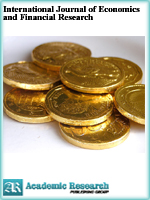International Journal of Economics and Financial Research
Online ISSN: 2411-9407
Print ISSN: 2413-8533
Print ISSN: 2413-8533
Quarterly Published (4 Issues Per Year)

Archives
Volume 4 Number 7 July 2018
Fighting Economic and Financial Crimes in Nigeria Using Forensic Accounting: The Moderating Effect of Technology
Authors: Edori Daniel Simeon
Pages: 235-241
Abstract
Increase in technology has been helping all sectors of the economy in Nigeria. Yet, there is no gainsaying the fact that technology has both the positive and the negative sides of it. While economic and financial crimes perpetrators manipulate the negative part, forensic accounting uses it as a tool to unearth perpetrators. Crimes classified as economic and financial remain major problem facing the Nigeria’s economy and the citizenries and many believe that forensic accounting is the only panacea in Nigeria. We used the survey method for the purpose of this study. Four hypotheses (null hypotheses) were tested using the Pearson product moment correlation coefficient (PPMC) statistical tool. We find that forensic accounting has a significant but negative relationship with economic and financial crimes; technology has significant and positive relationship with both forensic accounting and economic and financial crimes; and that technology moderates the relationship that exists between forensic accounting and economic and financial crimes. We then made some recommendations such as mandatory forensic accounting department ought be established in publicly and privately owned institutions and offices through regulatory authorities and not on voluntary basis; recruit forensic accountants/investigators/auditors in both the private and public sectors and regularly train and retrain them on current technologies; the Nigerian government should amend existing laws to meet the requirements of present day technological advancement. We then concluded that forensic accounting as afield has all it takes to fight economic and financial crimes in Nigeria and that technology moderates the relationship, though negative, between forensic accounting and economic and financial crimes hence the need for technological advancement in forensic accounting in order to fight against economic and financial crimes.
Causality Between Valued Added Tax (VAT) and Nigerian Economy: An ECM Approach
Authors: Nwaoha William Chimee ; Onwuka Onwuka Okwara ; Ejem Chukwu Agwu ; Ogbuewu Kalu James
Pages: 226-234
Abstract
This study used error correction model (ECM) to analyse the causality between Value Added Tax (VAT) and the Nigerian Economy proxied by GDP during the period 1994-2015. The data such as VAT and GDP were obtained from Central Bank of Nigeria (CBN) statistical bulletin and Federal Inland Revenue Services (FIRS). The results of the findings revealed that VAT exerts positive and significant influence on GDP while there was evidence of unidirectional causality running from VAT to GDP. Therefore, the researchers recommend that in order to enhance economic growth of Nigeria through VAT revenue, there is need to plug all the lapses identified in tax administration and educate the tax administrators as well as the entire populace on the relevant of VAT revenue to the economy.
Exploring the Key Factors Influencing Consumers’ Intention, Satisfaction and Loyalty towards Online Purchase in Bangladesh
Authors: Afzal Hossain ; Md. Abdullah Al Jamil ; Md. Masihur Rahman
Pages: 214-225
Abstract
Consumers online purchase intention is significant guide for operating online organization in Bangladesh. The major purpose of this paper is to explore the key factors that influence consumers’ intention, satisfaction and loyalty towards online purchase in Bangladesh. This paper adopts quantitative analysis of possible factors that may influence consumers’ intention, satisfaction and loyalty towards online purchase. By using Convenient Sampling technique the data has been collected from 200 respondents. Data are analyzed using frequency, mean, standard deviation and regression analysis. From the results of regression analysis, this research is found that security, personal hobby, payment method, appropriate pricing, privacy, social media and reference groups as the significant factors, which considerably influence consumers’ intention towards online purchase. This investigation is revealed that online purchases intention, product quality and product brand as the important factors, which significantly influence consumers’ satisfaction. This paper is also demonstrated that satisfaction as the momentous factor, which notably influences consumers loyalty in Bangladesh.
Empirical Analysis of Key Drivers of Gender Equality in Tertiary Education Enrolment in Africa
Authors: John C. Anyanwu
Pages: 197-213
Abstract
In addition to analyzing the characteristics of gender equality in tertiary education enrolment in Africa, this paper empirically studies the key drivers of gender equality in tertiary education enrolment, using cross-sectional time series data from 1970 to 2012. Our results show that the coefficient associated with the level of real GDP per capita is positive and statistically significant. Our results also suggest that higher domestic investment, increased economic globalization, the quadratic element of political globalization, economic globalization, ethnic fractionalization, increased democracy, and Christian dominance in a country increase gender equality in tertiary education enrolment in the continent. However, increases in the level of political globalization and increased incidence of civil wars tend to lower it. The policy implications and lessons of these results are discussed.



